How the town of Whitefish defeated its neo-Nazi trolls — and became a national model of resistance

WHITEFISH, Mont. — If you were to judge the small, northwestern Montana town of Whitefish solely on the national media frenzy that has descended upon it in recent weeks, like a blizzard that blots out everything else, then you’d probably write it off as a frightening place — an intolerant place, an unwelcoming place, a place where the worst of the United States has taken hold.
But what if the opposite were true? What if, at a moment of mounting political anxiety and creeping Internet thuggery, of fear and loathing and all the rest of it, Whitefish has, in fact, been demonstrating how America, at its best, can defeat such ugliness in the months and years ahead?
Because that’s what I found when I actually bothered to spend some time there. In the first weeks of January, I made two extended trips to Whitefish. I got to know dozens of locals — activists and actors, skiers and shopkeepers, loggers and L.A. transplants. What I found was a story that was a lot more interesting — and inspiring — than the one I had been reading about on the Internet.
***
The headlines have certainly been unsettling:
“Jewish leaders in Richard Spencer’s home town targeted in posting on neo-Nazi website”
“White Supremacists Threaten Jewish Community in Whitefish, Montana”
“‘We can march through town carrying high-powered rifles’: Neo-Nazi plans march against Montana Jews.”
Since mid-December, every Whitefish news alert has been about the same thing: its most notorious resident, white nationalist Richard Spencer, and the vicious neo-Nazi “troll storm” unleashed on other Whitefish residents, most of them Jewish, after Spencer and his mother, Sherry, accused a local realtor — Tanya Gersh, who is Jewish — of trying to run them out of town.

(Of the more than 6,000 people who live in Whitefish, only 100 or so are Jewish. There’s not even a synagogue nearby; members of the Glacier Jewish Community — a “synagogue without walls” — meet “wherever Jews can get together.”)
It’s a long, twisted tale, but the basic contours are easy to follow. Richard Spencer, who claims to have invented the term “alt right,” has spent the last 10 years or so promoting an ideology that, despite his hipster haircut, preppy vests and elite degrees, is really just neo-Nazism in disguise: Whites are a superior race, America belongs to people of “European” descent, and “peaceful ethnic cleansing” is necessary to establish an all-white “ethno-state,” where citizens who look like Richard Spencer can congregate under a “declaration of difference and distance.” The Southern Poverty Law Center describes him as a “suit-and-tie version of the white supremacists of old, a kind of professional racist in khakis.”
For seven years, Spencer has lived at least part-time in Whitefish; more recently, he has registered his mother’s home address as the principal office location of his innocuous-sounding “think tank,” the National Policy Institute. Before Sherry Spencer opened a shiny new commercial and vacation-rental building at 22 Lupfer Ave. in late 2015, Richard’s name was on the official documents.

Again and again, the town of Whitefish has tried to distance itself from Spencer’s noxious views, passing a series of symbolic resolutions denouncing hate groups and endorsing diversity. But the situation came to a head after the alt-right’s dream candidate, Donald Trump, won the 2016 presidential election, and after Spencer raised his glass and shouted “Hail Trump! Hail our people! Hail victory!” at an NPI gathering in Washington, D.C., in November, inspiring his lusty followers to respond with stiff-armed Nazi salutes.
What happened next is a bit of a puzzle, since neither party — Sherry Spencer or Tanya Gersh, the real estate agent — is speaking to the press. What we know is that members of Love Lives Here, a local activist group, became alarmed by the idea that Richard Spencer’s mother was somehow “facilitating” his white-nationalist activities. Talk spread of a sizable protest outside 22 Lupfer; Gersh appears to have been part of that conversation. When word reached Sherry Spencer, she phoned Gersh.
According to the co-director of the Montana Human Rights Network, Rachel Carroll Rivas, who spoke to Gersh “within an hour” of her call with Spencer, “Tanya and myself saw a window where we thought that potentially Sherry Spencer was not happy with how everything was playing out, and maybe she wanted to do something about it. Her words were, ‘I feel bad for my tenants. I feel bad for what the presence of my son has done in the Whitefish community.’” Gersh believed that, as a gesture of goodwill, Sherry Spencer was open to selling 22 Lupfer.
Spencer, however, seems to have seen things differently, and soon she accused Gersh of “shamelessly” trying to “act as my realtor” and pressure her into selling — perhaps, Spencer speculated, as a way of gaining “financial benefit from threats of protest and reputation damage.”
“Whatever you think about my son’s ideas,” Spencer continued, “in what moral universe is it right for the ‘sins’ of the son to be visited upon the mother?” (In a local op-ed published the same day, Sherry and her husband, Rand, made it clear that they do not agree with Richard’s ideas. “We love our son,” they wrote. But “we are not racists. We have never been racists. We do not endorse the idea of white nationalism.”)
“Somehow,” says Rivas, “the conversation went sideways.”

***
That’s when the troll storm began. “Jews Targeting Richard Spencer’s Mother for Harassment and Extortion,” wrote neo-Nazi Andrew Anglin on his Daily Stormer website. “TAKE ACTION!” Anglin encouraged his army to visit Gersh “in person.” He ran photos of her, her child, and other activists, including Rabbi Allen Secher, a Love Lives Here founder, superimposed over an image of a concentration camp decorated with a yellow Star of David identification badge from Nazi Germany. He posted their phone numbers, their Twitter handles and their email addresses.
“The Jews,” wrote Anglin, “are a vicious, evil race of hate-filled psychopaths. … So then — let’s hit ’em up.”
Right on cue, the death threats came flooding in. Activists and city council members were inundated; trolls sent vile messages to Jewish businesses in Whitefish — and to non-Jewish businesses they assumed were Jewish, like the popular Buffalo Café owned by the Maetzold family — while spamming their Yelp pages with negative reviews.
“Go choke on a shotgun and die,” read one note. “You would all be of greater worth to society as human fertilizer than as citizens.”
Spencer has not been accused of making threats, but neither did he seem to be bothered by them. In a series of YouTube videos and interviews, Spencer dismissed Anglin’s efforts as “mean words” and “pixels,” choosing instead to blame the controversy on the “morally repulsive” actions of Love Lives Here, which he described as a “local hate group.”

“Even criminal gangs don’t engage in such behavior,” Spencer said. “They don’t go after a rival’s mother. It is sick. And the person who did this is named Tanya Gersh.”
The lesson of all this, Spencer added, should not be lost on anyone. “I fight back,” he said. “And other people in my broader community, they’ll fight back, too. They’re gonna stick up for one of their own.”
When I arrived in Whitefish, Anglin had just escalated his harassment campaign, announcing that in mid-January — “just before the inauguration” — he and 200 neo-Nazis with “high-powered rifles” would be marching through the center of town to protest “Jews, Jewish businesses and everyone who supports either.”
“We will be busing in skinheads from the Bay Area,” Anglin wrote. “I have already worked out most of the details with the leaders of the local groups.”
On my first day in town, I met a young activist named Bo Zhang, who, like me, had traveled from the West Coast to see firsthand how the community was handling the situation.
“I can’t believe you’re going there alone,” a friend had said before she left Seattle. “Aren’t you afraid?”
***
As any visitor could tell you, the town of Whitefish doesn’t look scary. In winter, snow glazes the ground of the Flathead Valley and glistens on the needles of the tall Western white pines; to the northeast, the high peaks of Glacier National Park crown the horizon, beckoning the skiers and snowboarders who hang out on Central Avenue.
The Canadian border is only 60 miles away, but the signs and sandwich boards lining the streets would look familiar to any visitor from, say, Los Angeles: Stumptown coffee, crystals, Pilates, crepes, fresh sushi, acupuncture, local craft brewpubs and distilleries on nearly every corner. You can shop at a farmers market, sleep at a boutique hotel, work out at a CrossFit gym.
Trump clobbered Hillary Clinton by 20 percentage points statewide; in Flathead County, he won a commanding 65 percent of the vote. But Whitefish — alone among its less wealthy, less educated, less liberal neighbors — went for Clinton.
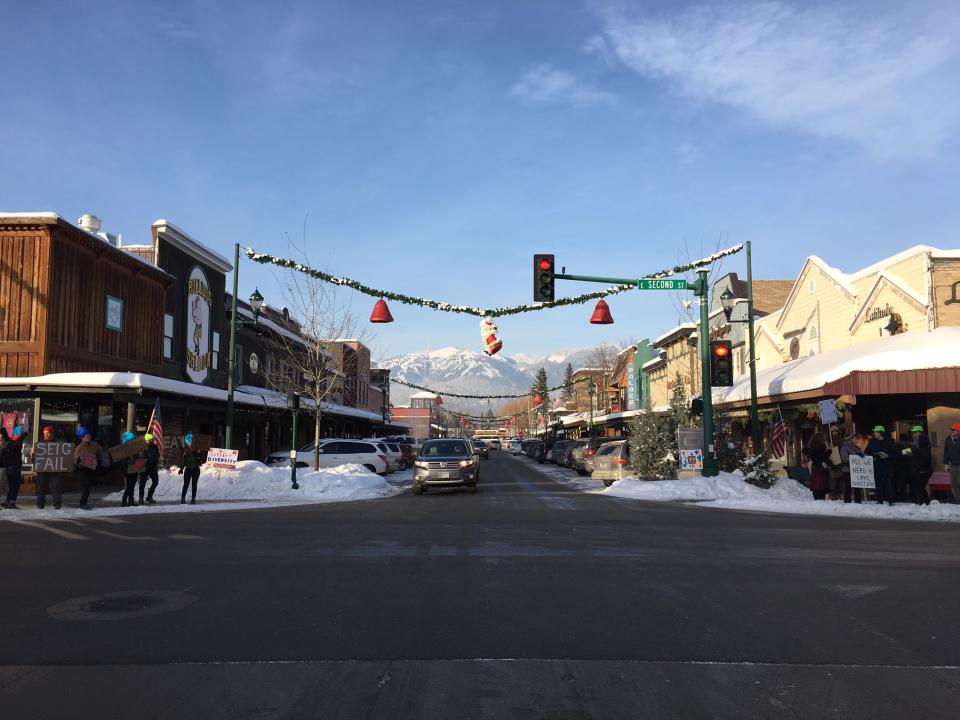
Yet for all of Whitefish’s cosmopolitan charm, there’s a strain of bigotry in the surrounding area. Montana was a bastion of the 1990s anti-government Patriot movement, which culminated in 1996 with an 81-day standoff between the FBI and an armed militia known as the Montana Freemen.
Western Montana in particular has long been home to small pockets of white supremacists who believe in the notion of a Northwest Territorial Imperative, which means they want to expel nonwhite people from the Pacific Northwest and transform the entire region into a monoracial Aryan republic.
In late 1993, neo-Nazis launched a harassment campaign in Billings, Mont., after locals put up menorahs in a show of solidarity with a Jewish boy whose window had been smashed by a brick. “Over two weeks in December,” the Associated Press wrote, white supremacists “broke windows at two Jewish homes and two churches that displayed menorahs, shot bullets through windows at Billings Central Catholic High School, and stomped and battered six vehicles at homes displaying menorahs, telling two owners in phone calls, ‘Go look at your car, Jew-lover.’”
More recently, in 2010, a group named Pioneer Little Europe started screening Holocaust denial films at the library in Kalispell, Flathead Valley’s largest city; its ringleader, neo-Nazi stage mom April Gaede, enjoyed a brief round of national notoriety in 2003 for training her twin daughters, Lamb and Lynx, to perform as Prussian Blue, a white-power singing duo.
The Montana Human Rights Network and Love Lives Here were formed in response to these provocations; their leaders recognize that white supremacists seem to be drawn to the region. (Since arriving in 2006, for instance, Gaede alone has lured a dozen new sympathizers to the Flathead Valley, according to MHRN’s research.)
“There are a few reasons why,” explains Rivas. “One, it’s a pretty white place, right? That’s part of the draw. It’s also a pretty rural, libertarian place. There’s a lot of ability to purchase land and get in and get involved in a community — that ‘Live and let live’ mentality. And it’s not necessarily an expensive place.”

But Spencer’s presence in town notwithstanding, the whole Daily Stormer campaign was something new. Anglin wasn’t a local troublemaker. Nor were his minions. They were Internet trolls intent on weaponizing bits and bytes, rather than bricks and bullets, to terrorize Whitefish from the comfort of their own futons.
This was a very post-2016 twist on a tale as old as the Ku Klux Klan, and the proposed march raised some dizzying questions: Was Whitefish actually in danger? Or was this all just fake news? Can digital trolling translate into physical marching? And did the distinction even matter when real people, in a real place, were really, truly afraid?
For his part, Spencer thought his neighbors should “stop freaking out.” “The trolls are playing the tune and you’re dancing to it,” he chuckled in one of his YouTube videos. “Which is kind of funny.”
But as soon as I set foot in Whitefish, it was clear that if there was a “joke” here — Spencer’s language — no one was laughing. Quite the opposite, actually: Whitefish was serious about the threats, serious about the Daily Stormer, and serious about the march, which Anglin, in true troll fashion, would soon reschedule for Martin Luther King, Jr. Day and rechristen the “James Earl Ray Day Extravaganza,” after King’s assassin.
The seriousness of the resistance was thanks, in part, to the community’s prior run-ins with neo-Nazis. Whitefish already had the information and infrastructure it needed to organize against Anglin & Co., regardless of whether these particular provocateurs ever managed to materialize in Montana with their “high-powered rifles.” The town was ready, in other words, to respond — for real.
“We don’t want to be like Hayden Lake, Idaho,” one Love Lives Here activist told me. “That’s our negative model — a town that just shriveled up and died because they let these people get a foothold and were slow to fight back.”
***

Signs of the resistance were everywhere. Strolling Central Avenue, I spotted blue paper menorahs in dozens of windows — the same menorahs that had first surfaced in Billings six years earlier. Same goes for the Love Lives Here logo. Picking up a local paper, I read about the bipartisan team of top Montana politicians — Democrats Sen. Jon Tester and Gov. Steve Bullock, and Republicans Rep. Ryan Zinke (Trump’s nominee for secretary of interior), Sen. Steve Daines and Attorney Gen. Tim Fox — who had recently joined together to declare that “those few who seek to publicize anti-Semitic views … shall find no safe haven here.”
A cashier at Amazing Crepes, one of the targeted businesses, recalled how her boss had refused to serve Richard Spencer, and how he continued to refuse even after Spencer, seeking to capitalize on the exchange, began to record it on his smartphone; a bartender at Tupelo Grille told me how her mixed-race friend had confronted Spencer at a local coffee shop. “Who picks fruit in your white state?” he’d asked.
Elsewhere, Whitefish Police Chief Bill Dial — who served as an officer in Skokie, Ill., back in 1977, when another band of Nazis famously tried to march through town — kindly explained that if any of their descendants were “going to protest in our city, I want them to understand they’re going to do it our way … or we’re going to kick their ass.”
But the most telling display of how Whitefish was fighting back was the one I’d ventured to Montana specifically to see. At the north end of Central, next to Depot Park, a late-morning block party was just getting underway. “Love, Not Hate” was the theme.
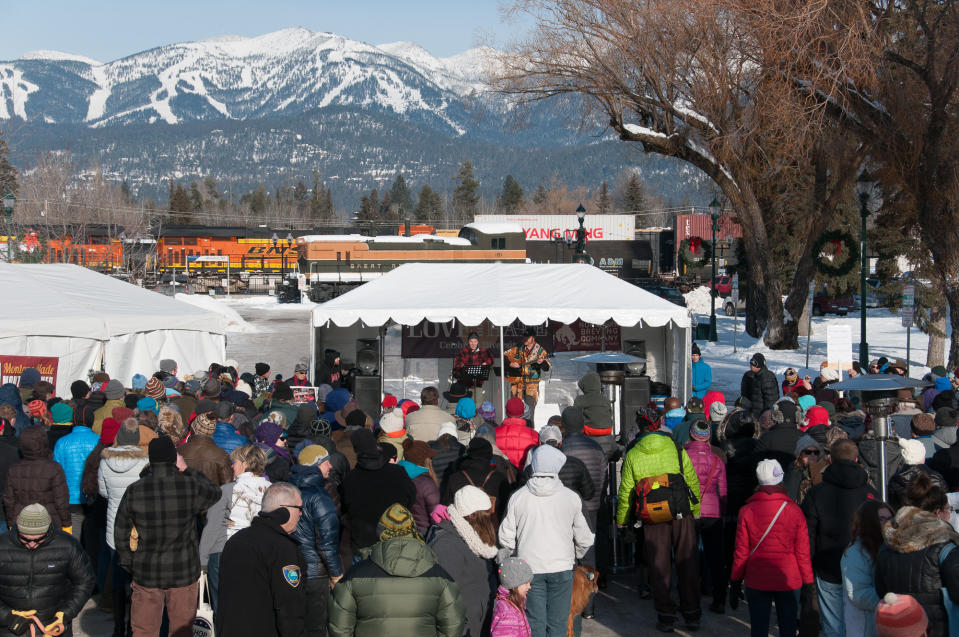
Inside the lobby of the adjacent O’Shaughnessy Center, neighbors huddled and hugged as they sipped coffee and hot cocoa and nibbled on pastries donated by local merchants. Some hand-painted messages of peace and harmony on small prayer flags (“We may have all come on different ships, but we’re in the same boat now”; “Love Trumps Hate”); others stuck Post-it notes to a makeshift “Wall of Empathy” (“You belong here”; “There are no others”). One table was bestrewn with $15 T-shirts — “love,” “hate” and “Whitefish,” with a line through the word “hate” — that were well on their way to selling out; another was covered with hundreds of sympathetic letters from around the country.
“The whole world is watching to see whether the U.S. will allow or support the continued harassment and discrimination against marginalized people,” read one from Cashmere, Wash. “Thank [you for] your bravery in standing up to ensure all residents are treated equally under the law.”
The event had been organized by two rookie activists, Jessica Laferriere and Dominica Cleveras, who were, as Laferriere told me, “learning as we go” (and fortunate to have Love Lives Here to lean on).
“We were really frustrated that Whitefish was in the news for all of these negative reasons, while all of the good stuff was getting lost,” she continued. “We knew we weren’t alone. Still, our initial vision was maybe 100 people in the park with a single PA system and a guy with a guitar. We never could have imagined this.”
With the temperature hovering around minus 7° F, hundreds had gathered outside. They stayed for more than two hours. There was a guy with a guitar (Blackfeet musician Jack Gladstone), and a girl, too (Halladay Quist); dancers from the Halau Ka Waikahe Lani Malie hula school performed barefoot.
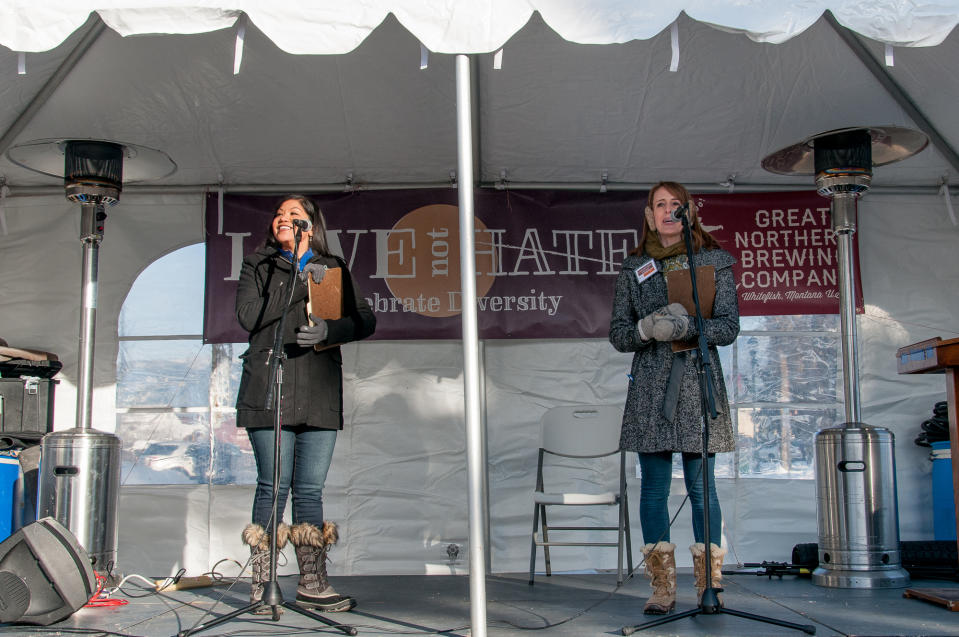
But the heart of “Love Not Hate” was a pair of speeches by two members of Whitefish’s tiny, badly shaken Jewish community. Both had the town in tears.
Hilary Shaw, executive director of the Abbie Shelter, a local domestic-violence resource, spoke first. Her grandfather, she said, is a Holocaust survivor who has always felt “an undercurrent of anxiety that he was never safe and that he would never really belong.”
“I am awed by the contrast of my experience as a member of this community,” Shaw continued. “I feel so privileged that I can speak publicly against hateful ideology without fear of persecution or discrimination.”
Shaw’s grandfather taught her to never “judge a book by its cover,” she told the crowd. Not all Germans were bad, he told her, and he passed on stories of those who had helped him survive Hitler’s regime.
“Now I find myself and my town under siege by hateful, cruel people, and while I’m trying to stay rooted in my values of kindness and fairness, it is getting harder,” she said. “It is easy to assert that Love Live Here when it’s business as usual. But now my beliefs about welcoming openness are really being put to the test.
“How do I hold to my compassion when faced with such shameless ignorance and hate? If I respond in anger — and I do feel angry — how will I know if I have crossed the line into hatred myself?”

The answer, Shaw said, was a kind of radical, against-all-odds empathy: to see the “deep loneliness in the people who are working hard to hurt us,” and to understand that those who hurt others have probably been hurt themselves.
Rabbi Francine Green Roston spoke shortly after. Back in New Jersey, Roston became the first woman in the Conservative rabbinate to serve a congregation larger than 500 members; she moved to the Flathead Valley in 2014 to replace Rabbi Allen Secher as the head of the Glacier Jewish Community.
Roston recounted the story of God telling Moses, at the edge of the Red Sea, to stop praying, and to act instead.
“I’m not telling you this because I don’t believe in prayer,” Roston said. “I pray every day, and even more, recently.”
The rabbi’s voice began to break. For several seconds, the park was silent, save for the sound of Roston sniffling. “You let us know that we are not alone,” she finally said. “You let us know that our community, that our amazing magnificent town of Whitefish, is not only protected by great, divinely formed mountains of earth — this town is protected by a wall of humanity that refuses to be quiet or sit still in the face of bigotry, racism, sexism, homophobia or anti-Semitism.”
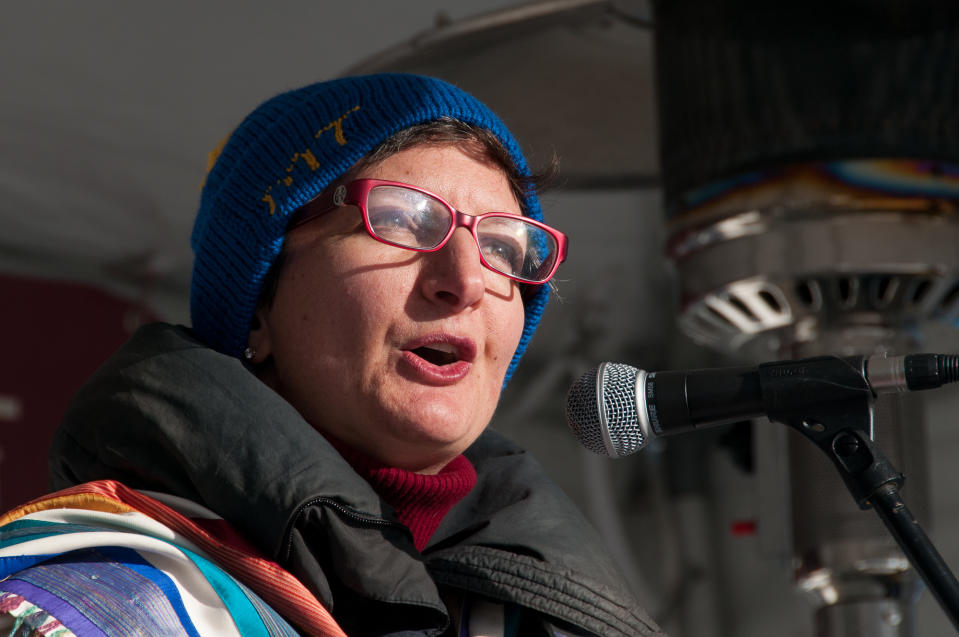
Roston and Shaw had stepped to the microphone to publicly proclaim their resistance — an act they knew full well could provoke more threats, more trolling. That took real courage. The fact that hundreds of their non-Jewish neighbors stood in the crippling cold to cheer them on was a powerful reminder — to the world outside, and to the Nazis themselves — of how marginal the haters really were. In Whitefish, the majority had refused to remain silent.
Yet I couldn’t help but notice a lingering sense of unease, even fear, despite all the talk of tolerance and love. Martin Luther King, Jr. Day was still more than a week away. No one knew what would happen. After the event, I approached Rabbi Secher, but he quickly backed away; Rabbi Roston looked terrified when I told her I was a reporter. I felt guilty. They were reluctant to attract more media attention, and rightly so.
Rachel Carroll Rivas, the co-director of the Montana Human Rights Network, explained the situation.
“In the weeks post-election, we received more reports of hate incidents in the state than I receive in a year, on average,” Rivas told me. “We’ve also seen an increase in fliering by white supremacists in the Flathead Valley, and that is a direct result of Anglin and Spencer spreading these ideas and saying they are legitimate. It has emboldened local activists to up their game.”
It was these “April Gaede types,” she suspected, who had told the Daily Stormer which Whitefish businesses to target — likely by looking for Love Lives Here signs in their windows.
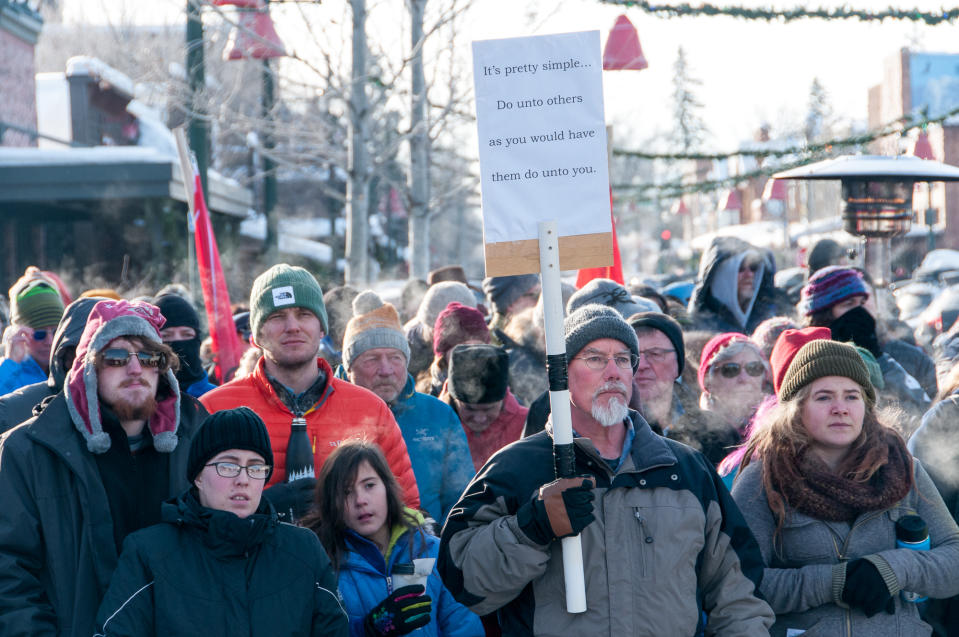
“Anglin is not a community organizer,” Rivas continued. “He’s an online troll. He may not have the capability to pull off the march himself. But the reality is that he doesn’t control everyone who is paying attention and who is susceptible to his hateful ideas. Same for Richard Spencer. So do I think there will be 200 skinheads there next Monday? I don’t know. But even if there aren’t, that doesn’t mean some random person won’t show up with a gun. That’s the moment we still need to watch for.”
***
And so, on MLK Day, I went back to Whitefish. I wanted to see how the whole thing would end.
By then, the Daily Stormer’s official “James Earl Ray Day Extravaganza” had evaporated. Anglin had failed to file a complete permit application, failed to pay the full fee, failed to purchase insurance and failed to notify business along the parade route — probably because, as Rivas had put it, he is an online troll, not a community organizer. Predictably, Anglin blamed “Jewish trickery” for his misfortunes and promised that an even “bigger” march with “more guns and special guests than we originally planned” would take place in February. But mobilizing hundreds of neo-Nazi to travel to a remote corner of Montana in the dead of winter isn’t easy — and as one Daily Stormer commenter admitted, “at some point its [sic] too late to be relevant.”
Even so, the 16-man Whitefish police force had summoned 100 officers from other jurisdictions for the occasion, and from 4 p.m. to 7 p.m. — the hours when the march was scheduled to happen — Love Lives Here was hosting a last-minute retreat at the middle school for families seeking refuge from whatever messiness might unfold on the streets. There were still white supremacists in the area. People were still concerned.
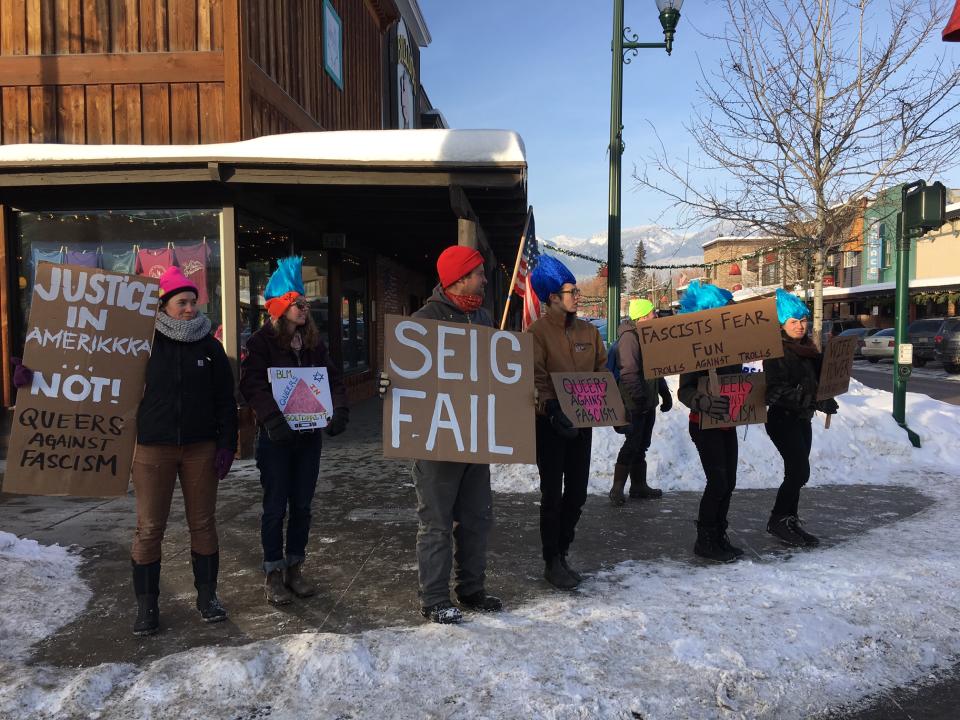
I pulled into Whitefish right at 4 p.m. As I made my way toward Central, the previous weekend’s prayer flags now fluttering above the sidewalk in the low, late afternoon sunlight, I could hear passing pickup trucks honking their horns. My heart jumped. There were protesters gathered at the corner. Some were holding signs with swastikas on them.
I shouldn’t have worried. It was just a bunch of puckish left-wing activists, up from Missoula, several of whom were wearing bright blue troll-doll wigs. “Trolls Against Trolls.” “Seig [sic] Fail.” “Fascists Fear Fun.”
I asked whether they’d seen any skinheads.
“Some people didn’t like our signs,” one troll told me. “But that doesn’t make them Nazis.”
Over at the middle school, the usual announcements had been replaced on the marquee by a simple suggestion: “Be kind.” Cardboard signs steered visitors toward “free soup.” Down the hall, a “Matzo Ball Soup Brigade” had assembled.
“Nothing like chicken soup & matzo to help everyone calm down,” read one placard. “Look for a bowl, not a bang,” read another, above a childlike drawing of a gun.
As volunteers wearing goofy hats made from empty boxes of Manischewitz Matzo Ball Mix ladled hot soup into cups and hauled crock pots outside to feed the shivering counterprotesters, I sat down next to Juliena Moore and her 26-year-old daughter, Sheena. Moore told me that all four of her children have autism spectrum disorders, including Sheena — who was quick to point out that she hasn’t let her disability stop her from cross-country skiing in the Special Olympics or creating a jewelry business with her mom.
“It’s frustrating to see how much hate has arisen since the election,” Juliena added.
Here? I asked. Or everywhere?

“Both,” she said. “I remember just feeling so depressed and so devastated. Usually, I couldn’t care less which party wins or loses. But this time, I found that I actually did care. Because, as the mother of disabled children, the most vivid image I had was of Donald Trump mocking that disabled reporter. It made me realize that my kids don’t have a place in this new world of his.”
Does that have anything to do with why you came out today? I wondered.
“It does,” Juliena said. “I’m not going to let that kind of bigotry ruin my life. My disabled children have contributed so much to this community. Every time someone tries to spread hatred, we should always try to speak louder.”
It was almost 7 p.m. I walked back to the center of Whitefish. It was so quiet I could hear my footsteps echoing off the icy pavement. The counterprotesters were gone. The white supremacists had never shown up. Richard Spencer was 2,300 miles away in Washington, D.C.
According to Will Randall, the chairman of Love Lives Here, it was too early to declare victory. You never know, he said. Maybe Anglin and his allies will march next month. And yet, he added, there were lessons to be learned.
“What this has shown me is that if we want to make a change as a community, our best way to do that is at the grassroots, local level,” Randall told me. “That’s where can confront these issues of racism and anti-Semitism and bigotry first. It’s not just someone on social media making a comment — thumbs up, thumbs down. It’s neighbors meeting face-to-face and coordinating plans to put their values out there. It’s pretty powerful stuff. Here in Montana, we might not have much say nationally. But we can make Whitefish a better town. And if we do that all around the country, I think the national narrative can change.”
Later that evening, Love Lives Here hosted its ninth annual MLK Day celebration — an event produced, as usual, by Rabbi Secher, who as a Freedom Rider in the early 1960s, marched alongside King, a figure Spencer has derided as “a fraud and degenerate,” as well as a symbol of “White Dispossession and the destruction of Occidental civilization.”
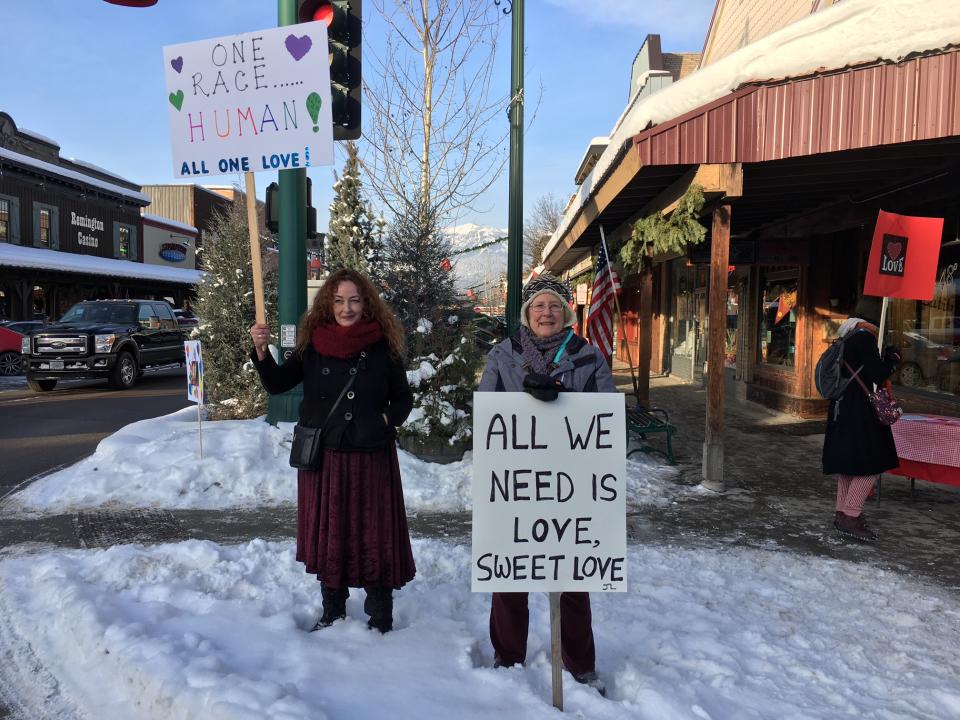
“Whatever the place you have known or the flags of your heritage,” Secher announced at the start of the program, “you’re welcome here.”
Singers sang. Musicians played. An actor recited King’s Letter from Birmingham Jail. Students read their own letters to the incoming president about their “dreams for the future” — some from the left, some from the right, all respectful and rooting for his success.
And near the end of the night, Rabbi Francine Green Roston took the stage again. She hesitated before she spoke — and when she finally did, her soft voice was trembling with emotion.
“I can tell you that for the past two and a half years, there were moments when I questioned if we’d made the right move for our family,” Roston said. “And I can tell you, for the past five weeks, I have had no doubt that Whitefish, Mont., is our home.”
The hall erupted in cheers. It sounded, to my ears, like some kind of catharsis.
That Roston still needed convincing after all that time was proof, I suppose, of the brokenness of the world. But as the applause died down, I was reminded of something a man named Rick Nagle had told me over coffee earlier that day. Now 70, Nagle is a Vietnam veteran from Cincinnati who moved to the Flathead Valley more than two decades ago. In 1967, he participated in one of Martin Luther King, Jr.’s equal housing demonstrations in Louisville, Ky. — “primarily because our base commander told us not to,” he laughed. It was there that Nagle first discovered what patriotism meant to him.
“I remember a bunch of hillbillies standing on the side of the street calling me a ‘nigger lover,’” Nagle said. “And I realized then that the only way it gets done is if I do it.”
The only way what gets done? I asked.
“Democracy,” Nagle replied. “Over the last 10 or 15 years, I’ve been lazy. I lost my sense of patriotism. But I think this election has changed that. It’s always easy for everybody to get riled up for two or three weeks after Election Day. And then they have to go buy Christmas presents, and in January, they forget about it. But this time they didn’t do that. I think that the enthusiasm and commitment you’re seeing in Whitefish is for real — and it’s not limited to Whitefish. I think that people are realizing that democracy is their responsibility.”
Read more from Yahoo News:




